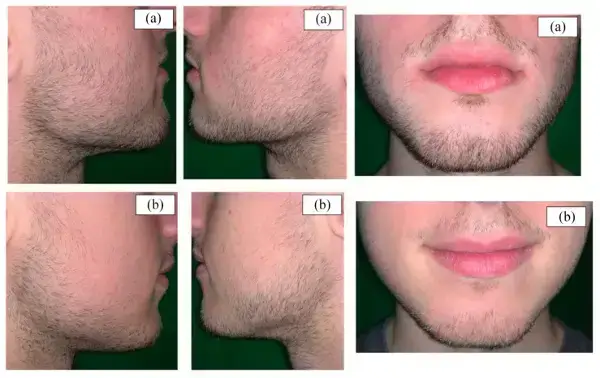Many years ago I noticed that my decrease in scalp hair correlated with my increase in body hair. The men in my extended family who had the best scalp hair into old age also had the least amount of body hair. At the time, I also did some research into the two main methods of permanent body hair removal:
- Electrolysis.
- Laser Hair Removal.
I ended up getting some electrolysis to remove minor amounts of my ear hair, middle of eyebrows hair, and back of lower neck hair. It took years of once a month sessions, but was ultimately effective. Never trust an electrologist who promises speedy results. So many of them exaggerate the speed of permanent hair removal with electrolysis.
Paradoxical Hypertrichosis: Increased Body Hair after Laser Hair Removal
In any event, while doing research on laser hair removal, I came across something interesting (and disturbing). For some people who get laser body hair removal, they end up with even more body hair in the treated area(s). A phenomenon called “paradoxical hypertrichosis“.
After getting across the initial surprise, I then got excited. If lasers can grow “new” body hair in areas where there was none, perhaps they can also cause “new” head hair growth? So the claims of the manufacturers of low-level laser devices for hair growth were not lies after all? Of course these home use devices have much less power than the laser hair removal machines that you see in clinics. But the logic remains.
We also know that fractional lasers can promote hair growth according to some findings. As can scalp burns, intentional wounding, lightening injury, wearing a cast for a long time, sound waves, electricity, electromagnetic radiation and more. In some cases it is new hair, while in others it is just thickening of existing hair or reversal of recent miniaturization.
However, in the back of my mind, I know that most of these phenomena are rare and usually not verified by any large-scale reputable studies. Nevertheless, I do believe that some of the logic is trustworthy.
The following quote (credited to Dr. George Cotsarelis) from the old Follica website is perhaps my favorite when it comes to the hair loss world:
“Following skin disruption, cells that migrate to help healing are forced to make a decision: Should I make epidermis, or should I make a hair? There is a window of opportunity in which we can potentially push them to choose the latter, and we believe there are multiple biological pathways to target to enhance this outcome. This regenerative effect is called hair follicle neogenesis.”
Are the Number of Paradoxical Hypertrichosis Cases Exaggerated?
Getting back to paradoxical hypertrichosis, one 2005 study stated that it is “a real but rare event that is estimated with 95% confidence to occur in 0.01% to 1.9% of treated patients.”
A more recent 2024 study from Japan found that of the 7,381 patients who received laser hair removal:
“25 patients (0.34%) demonstrated an increase in hair growth compared to baseline. Of these 25 patients, 24 had been treated with the alexandrite laser (and 1 had been treated with the diode laser)”.
A 2018 case report from the US found that even 10 years after the initial side effect of paradoxical hypertrichosis, the new body hair did not entirely disappear.
One well known dermatologist recently told me that he thinks this phenomenon of paradoxical hypertrichosis is basically hogwash. In his opinion, many women who are just starting to grow excess hair (hirsutism) turn to laser hair removal right away.
But because they do not get on anti-androgens, their hormones are dictating new hair growth rather than any paradoxical reaction to the laser. This dermatologist told me that most spa workers have never even heard of anti-androgens. Women with hormonal conditions such as polycystic ovary syndrome (PCOS) or Cushing’s syndrome can also see new body hair growth develop out of the blue.
In any event, I hope that paradoxical hypertrichosis is in fact a real phenomenon, and can even apply to the scalp. On Reddit, you can read about a number of cases where people grew more hair after laser hair removal. It seems like you can laser away this new hair in most cases, though it is expensive as well as more difficult if you have darker skin.


